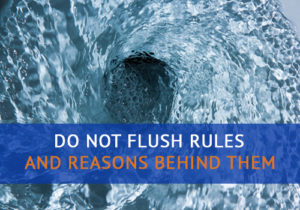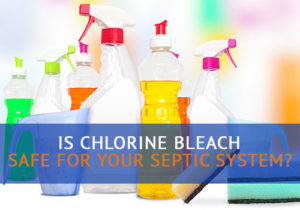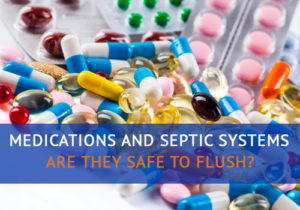 A lot of septic care starts with how you treat your system. This includes monitoring the items that you put into it through the sink or toilet. In fact, following Do Not Flush Rules is one of the biggest things you can do for your septic system.
A lot of septic care starts with how you treat your system. This includes monitoring the items that you put into it through the sink or toilet. In fact, following Do Not Flush Rules is one of the biggest things you can do for your septic system.
There are plenty of things on the list of Do Not Flush Rules that you may already know about. But, what you might not know is WHY you should not put those things into your septic system.
So, here’s a list of things that you should not flush, and the reasons behind the items.
The Reasons Behind Do Not Flush Rules
While all of these rules help keep your septic system healthy, the reasoning’s vary. From avoiding clogs to keeping the bacteria healthy, following these Do Not Flush Rules is imperative to septic health.
Bad for Septic Bacteria
By not flushing the following products, you’re saving the bacteria in your septic system.
- Pharmaceuticals
- Bleaches
- Paint thinners
- Insecticides
All of these things are items that are toxic to you and your septic system. How? They threaten the health of your septic bacteria.
Let’s use Bleach as an example.
 The chlorine in your household bleach is the same that you would find in your Clermont drinking water. Why? Chlorine is a disinfectant that kills viruses, algae, and bacteria that lead to water-born illnesses.
The chlorine in your household bleach is the same that you would find in your Clermont drinking water. Why? Chlorine is a disinfectant that kills viruses, algae, and bacteria that lead to water-born illnesses.
And, this chlorine also found in household bleach is responsible for getting those pesky salsa stains out of the white shirt that you bought just yesterday.
However, pouring bleach down your drain can wreak havoc on your septic system. Why? Because it kills bacteria.
Your septic system relies on a healthy number of bacteria to break down and treat the waste water that comes from your house and goes to the drain field for reabsorption.
If your beneficial bacteria are harmed, then the waste begins to build up in your septic tank. This could lead to expensive repairs and environmental problems.
Will Cause Clogs
Any food or item that is fibrous, starchy, or stringy can cause major clogging issues in your drain and pipes that lead to your septic system. This also includes any food that has a rind or peel. The following products (and similar items) grace the Do Not Flush Rules as they cause clogs and wreck havoc on your pipes.
- Fibrous or starchy foods
- Potatoes
- Celery
- Onion Skins
- Artichoke
- Asparagus
- Corn husks
- Coffee Grounds
- Eggshells
- Rice
- Quinoa
- Pasta
- Flour
These foods can cause problems when they get wrapped around your garbage disposal. Or, they can become a tangled mass further down your septic system.
Also, starchy foods have a tendency to decompose in a congealed mass. It’s like cooking potatoes for too long and they turn into a thick mushy paste. This paste, if caught in your septic pipes, can cause a major hold up.
Grease, Oils, and Fats
These culprits will coat your pipe in slime and create a type of sludge. If this builds up over time, it could constrict your pipes and block the passage, preventing anything from getting through.
Such food stuffs are comprised of (or can break into) tiny pieces. They build up or expand in your pipes, sometimes immediately causing blockage.
Bathroom and Hygiene Products
- “Flushable” Wipes
- Diapers
- Towelettes
- Floss
- Feminine Products
- Cotton Swabs
- Floss
Most of these items may fool you into thinking they are made of organic or compostable materials. Therefore, it’s easy to see why so many people think that they are safe to flush, but they aren’t. It’s true that they will decompose eventually, but not as quick as toilet paper will.
The items listed above are also responsible for you guessed it — causing clogs in your septic pipes. It’s also possible for them to sit and amass in the sewer system. London recently released a campaign asking residents to stop sending diapers, towelettes, and other fat products into the sewer. They cause masses that are affectionately called “fatbergs.”
Avoiding Water Contamination with Do Not Flush Rules
 As mentioned above, pharmaceutical medications are bad for the health of your septic bacteria. They can also contaminate your water supply.
As mentioned above, pharmaceutical medications are bad for the health of your septic bacteria. They can also contaminate your water supply.
If your septic bacteria aren’t breaking down waste completely, it can be pushed into your drain field. Here the toxic pharmaceuticals can be reabsorbed into the ground and make their way into your drinking water.
A recent study says that over 40 million Americans are currently at risk of consuming water that is contaminated by such medication.
Remember, even if the pharmaceutical medication is expired, it still contains harmful chemicals. There are safe ways to dispose of these medications.
Following the items on this list can save you money and stress. However, being informed can also ensure the health of your loved ones and the environment.
For more answers to your Do Not Flush questions, contact Advanced Septic Services, of Clermont, FL at 352-242-6100. We’re happy to provide you with more information.

